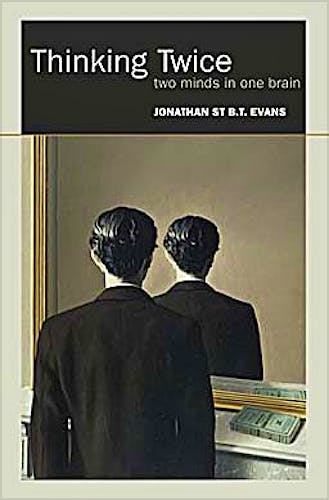

No hay productos en el carrito



Thinking Twice. Two Minds in One Brain
Evans, J.
1ª Edición Septiembre 2010
Inglés
Tapa dura
256 pags
1000 gr
16 x 23 x null cm
ISBN 9780199547296
Editorial OXFORD
LIBRO IMPRESO
-5%
68,04 €64,64 €IVA incluido
65,42 €62,15 €IVA no incluido
Recíbelo en un plazo de
2 - 3 semanas
ABOUT THIS BOOK
- Explores a fascinating and counter-intuitive idea that humans have 2 distinct minds operating within their brains, showing how a conflict between the two can result in irrational and even dangerous behaviour
- Accessibly written by a world class scientist who has spent his life studying the mind, and based around cutting edge work from the cognitive neurosciences
- Offers explanations of why we can behave in such apparently irrational ways - whether from phobias of harmless insects, to extreme cases of absent mindedness, leading to harm of our ourselves or others
Common sense would suggest that we are in complete control of the actions we perform - that all our actions are the result of considered and conscious preparation. Yet, there are countless examples of this control breaking down, for example, in the case of phobias and compulsive actions. We can all recall those times when, in the 'heat of the moment', our actions have been very different to those that would have resulted from calm and considered reflection. In extreme moments of 'absent-mindedness' our actions can even have castastrophic consequences, resulting in harm to ourselves or others. So why does this happen - why do apparently rational and intelligent beings make, what appear to be, such fundamental errors in their thinking.
This book explores the idea that humans have two distinct minds within their
brains: one intuitive and the other reflective.
The intuitive mind is old, evolved early, and shares many of its features with
animal cognition. It is the source of emotion and intuitions, and reflects both
the habits acquired in our lifetime and the adaptive behaviours evolved by ancient
ancestors.
The reflective mind, by contrast, is recently evolved and distinctively human:
it enables us to think in abstract and hypothetical ways about the world around
us and to calculate the future consequences of our actions. The evolution of
the new, reflective mind is linked with the development of language and the
very large forebrains that distinguish humans from other species; it has also
given us our unique human form of intelligence. On occasions though, our two
minds can come into in conflict, and when this happens, the old mind often wins.
These conflicts are often rationalised so that we, conscious persons, are unaware
that the intuitive mind is in control.
Written by a leading cognitive scientist, this book demonstrates how much of our behaviour is controlled by automatic and intuitive mental processes, which shape, as well as compete, with our conscious thinking and decision making. Accessibly written, and assuming no prior knowledge of the field, the book will be fascinating reading for all those interested in human behaviour, including students and researchers in psychology, neuroscience, and philosophy.
Readership: Popular science readership; students and researchers in psychology, neuroscience, and philosophy
AUTHOR INFORMATION
Jonathan St BT Evans, Emeritus Professor of Psychology, University of Plymouth
TABLE OF CONTENTS
1: The two minds hypothesis
2: Evolutionary foundations
3: Two ways of knowing
4: Two ways of deciding
5: Reasoning and imagination
6: Thinking about the social world
7: Consciousness and control
8: The two minds in action: co-operation and conflict
Addendum: Some technical issues
References
© 2025 Axón Librería S.L.
2.149.0